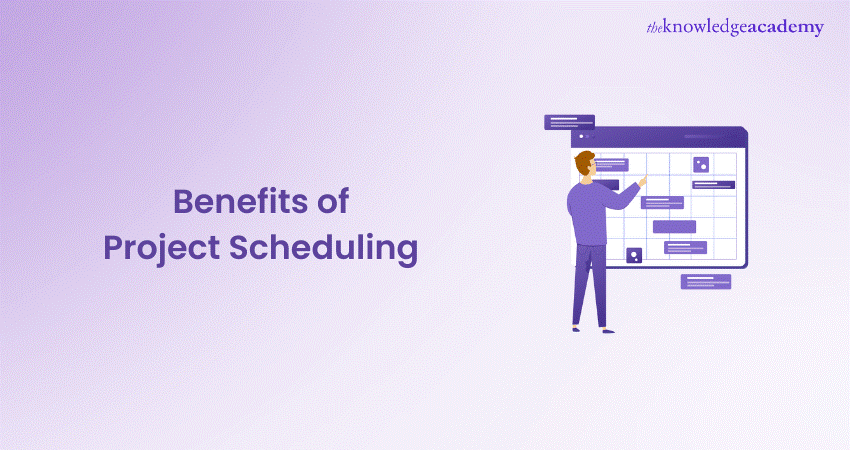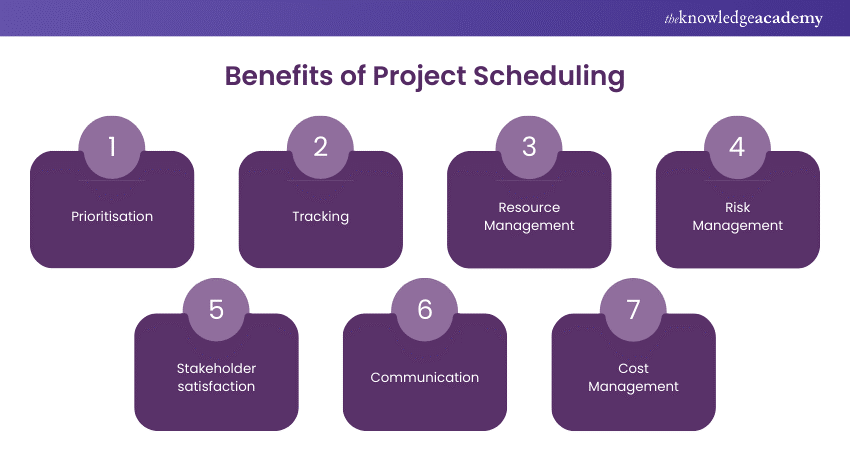We may not have the course you’re looking for. If you enquire or give us a call on +44 1344 203999 and speak to our training experts, we may still be able to help with your training requirements.
Training Outcomes Within Your Budget!
We ensure quality, budget-alignment, and timely delivery by our expert instructors.

Imagine planning a project where every task aligns perfectly with your goals; that's where Project Scheduling steals the show. It's not just a plan; it is a strategic tool that transforms how we tackle projects, ensuring every step we take is calculated and every resource is optimised. Dive into the world of Project Management and discover the myriad Benefits of Project Scheduling that await.
Table of Contents
1) What is Project Scheduling?
2) Key Benefits of Project Scheduling
a) Prioritisation
b) Tracking
c) Resource management
d) Risk management
e) Stakeholder satisfaction
f) Communication
g) Cost management
3) Conclusion
What is Project Scheduling?
Project Scheduling is the process that involves allocating start and end dates to the project tasks and developing a comprehensive schedule that links the project launch to the final deadline. It’s just like a conductor’s score for an orchestra, where every note is a task, and the tempo is the work speed. This approach ensures that every task is covered, resources are distributed effectively, and opportunities to eliminate impending bottlenecks are spotted early.
A well-crafted schedule is a live document that changes to keep the team members and stakeholders informed of the progress, from team members to stakeholders. It is the choosing of order amidst the possibility of chaos, a pledge to offer guaranteed quality within stipulated timelines.
With Project Scheduling, teams have a breathing space which gives them the confidence to navigate the complexities of Project Management, implying a successful journey for every project.
Project Scheduling isn't just a series of dates on a calendar; it's the heartbeat of Project Management, ensuring projects pulse forward on time and within budget. It weaves together a project's timeline, detailing the start and end of tasks, the interconnections between them, and the resources required.
However, strategic planning is about going beyond logistics, where the entire process is a sequence of activities, each of which is a step towards attaining the end objectives of the project. Let's get right to the heart of the Project Scheduling topic, exposing a lot more than just a planning tool - Project Scheduling is about bringing purpose, productivity and satisfaction to every project.
Benefits of Project Scheduling
Let's take a detailed look at the advantages of Project Scheduling.

Prioritisation
At the heart of Project Scheduling lies prioritisation, a process that isn't just about ticking boxes but aligning every action with the project's strategic vision. It's an art form that balances the importance and urgency of tasks, guiding Project Managers to channel their efforts into initiatives that pack the biggest punch. Thus, with this approach, the team is always on track, and no one is distracted or declines the importance of their contribution to the project.
a) Strategic focus: With the focus on reaching the big picture, actions become similar to targets as they only support the overall goals.
b) Efficient resource use: Guarantees that time, people, and materials are invested in tasks that matter most, optimising impact.
c) Enhanced decision-making: Provides a crystal-clear framework for informed choices on task sequences and where to deploy resources, ensuring the project sails smoothly towards its destination.
Tracking
Tracking isn't just about following up; it's about keeping a finger on the project's pulse, feeling every beat of progress and identifying any errors before they become serious. This continuous monitoring ensures that the project's heart never skips a beat, allowing for proactive management that keeps everything flowing seamlessly.
a) Real-time updates: Offers a live feed of the project's health, enabling swift action to keep everything on track.
b) Performance insights: Sheds light on how well the team is performing, highlighting triumphs and areas ripe for improvement.
c) Transparency: Builds a glass bridge between stakeholders and the project, fostering trust through visible progress.
Master the art of successful Programme Management with Programme Management (PgM) Course. Your path to excellence!
Resource management
Resource management in Project Scheduling is akin to conducting a symphony, ensuring each member—the personnel, equipment, and materials—plays their part at the right moment. It's about creating harmony, preventing the cacophony of resource shortages or excesses, and maintaining a melody that resonates with efficiency and balance.
a) Optimal resource flow: Makes sure resources glide into place exactly when needed, avoiding bottlenecks and waste.
b) Cost harmony: Keeps the budget in tune, avoiding the dissonance of financial overruns.
c) Balanced workloads: Ensures no team member faces the burnout of an overwhelming solo, promoting a healthy work-life composition.
Risk management
Risk management through Project Scheduling is like choreographing steps in a dance, anticipating moves and ensuring the performance flows smoothly, even when surprises arise. By identifying potential pitfalls early, the project can gracefully pirouette around them, minimising disruptions and keeping the show on the road.
a) Proactive steps: Enables the project to dance around potential pitfalls gracefully, reducing chances of missteps.
b) Contingency choreography: Crafts backup routines, ensuring the project can keep moving even when unexpected twists occur.
c) Softened falls: Ensures that, even when trips happen, the project lands softly, minimising impact.
Stakeholder satisfaction
The ultimate measure of a project's success is the applause of stakeholder satisfaction, achieved when expectations are met or exceeded. Project Scheduling plays a starring role in this, orchestrating the delivery of the project not just on time but with a performance that earns a standing ovation for quality.
a) Clear communication lines: This acts as a megaphone, ensuring stakeholders are always in the loop and fostering a shared understanding and expectations.
b) Realistic expectations: Set the stage with achievable timelines, preventing disappointments and building a reputation for reliability.
c) Trust encore: Consistently meeting schedules builds a rhythm of trust, encouraging stakeholders to return for future projects.
Communication
Effective Communication is the lifeline of any project. Project Scheduling plays a pivotal role in ensuring that all stakeholders are kept in the loop about project developments.
a) Information dissemination: It is about ensuring that all project stakeholders have access to the information they need it. A project schedule acts as a communication tool that informs team members about upcoming task, deadlines and dependencies.
b) Clarity of expectation: Clear communication through the schedule sets expectations for all team members. Timely information sharing fosters a collaborative work environment.
c) Feedback loops: They are essential for continuos improvement within the project. Project Scheduling allows for regular check-ins and updates, which are perfect opportunities for feedback.
Unlock your path to success with our Project Management Certification and become a Project Management pro!
Cost management
Cost management is the other vital benefit of Project Scheduling. A completion within the set budget is achieved by this, thus avoiding cost overruns.
a) Budget tracking: It is the process of tracking the project's actual expenditure with the allocated budget. The Project Schedule makes it possible to forecast costs as well keep track of the actual spending.
b) Value analysis: It involves evaluating how project tasks contribute to overall valur and return on investment. Project Scheduling aids in identifying high-value tasks that should be prioritised.
Unlock your potential as a Project Manager with our comprehensive Project Management Courses. Embark on your journey to success today!
Conclusion
To sum up, Project Scheduling is a holistic method that consists of prioritisation, tracking, resource allocation, Risk management, and stakeholder satisfaction. Acknowledging the Benefits of Project Scheduling contributes to the development of timely and cost-effective project execution, allowing organisations to achieve their strategic goals.
Unlock your potential with our Project Management Certification and lead with confidence. Join now!
Frequently Asked Questions

Principles of Project Scheduling:
1) Define clear objectives
2) Sequence activities
3) Allocate resources
4) Estimate durations
5) Monitor and adjust

Key elements of a project Schedule are:
1) Timeline
2) Tasks
3) Resources
4) Dependencies
5) Team members

The Knowledge Academy takes global learning to new heights, offering over 30,000 online courses across 490+ locations in 220 countries. This expansive reach ensures accessibility and convenience for learners worldwide.
Alongside our diverse Online Course Catalogue, encompassing 17 major categories, we go the extra mile by providing a plethora of free educational Online Resources like News updates, Blogs, videos, webinars, and interview questions. Tailoring learning experiences further, professionals can maximise value with customisable Course Bundles of TKA.

The Knowledge Academy’s Knowledge Pass, a prepaid voucher, adds another layer of flexibility, allowing course bookings over a 12-month period. Join us on a journey where education knows no bounds.

The Knowledge Academy offers various PMP Training , including CAPM Certification Training, PMI-ACP, and PMP exam prep. These courses cater to different skill levels, providing comprehensive insights into Project Portfolio Management.
Our Project Management blogs covers a range of topics related to Project Management, offering valuable resources, best practices, and industry insights. Whether you are a beginner or looking to advance your Project Management skills, The Knowledge Academy's diverse courses and informative blogs have you covered.
Upcoming Project Management Resources Batches & Dates
Date
 PMI Scheduling Professional PMI-SP® Training
PMI Scheduling Professional PMI-SP® Training
Mon 17th Mar 2025
Mon 26th May 2025
Mon 14th Jul 2025
Mon 22nd Sep 2025
Mon 24th Nov 2025
Mon 8th Dec 2025







 Top Rated Course
Top Rated Course



 If you wish to make any changes to your course, please
If you wish to make any changes to your course, please


